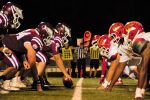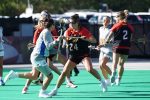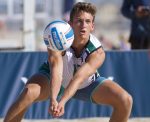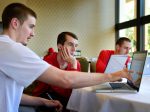With the fanatical support of his father, the Prince of Saudi Arabia and the University of Kansas Athletic Coaches and Staff, Hussain Al Hizam is that much closer to standing on top of the Olympic podium in 2020.
Many college athletes have a story, some rich history complete with successes and, unfortunately, sometimes fraught with athletic peril. Al Hizam is one of these athletes.
A native of Saudi Arabia who overcame two nearly career-ending injuries, Al Hizam started pole vaulting when he was just eight years old and passionately pursued an athletic career in the sport, which lead him to break several world records.
With the numerous successes Al Hizam has already seen in his career, it is easy to wonder what could possibly be next for this astounding athlete. Even after fracturing multiple vertebrae in his back, Al Hizam still saw a future in pole faulting. After tediously perfecting his craft for so long, there was no reason to give up in the face of adversity.
It was understood that nothing would hold Hussain back from victory.
Natalie Washuta: Your father is a former decathlete and a current coach. Did this family history of athleticism influence your desire to compete in track?
Hussain Al Hizam: I actually tried many sports, such as soccer, volleyball, tennis and basketball, and I was fairly good in all of them. However, after bearing witness to some pole vaulters my dad coached, I knew I had to try it out. At first it just seemed really cool to do, but then I truly fell in love with it and the rush it gave me.
NW: The Prince of Saudi Arabia showed great interest in your athletic prowess, especially after you suffered such horrific injuries. Why did he want you to receive medical care in the United States? Is there a history between you and him?
HAH: Prince Nawaf Al Saud is the former President of the Athletics Federation in Saudi Arabia. He knew me since I was a little kid and he saw my progress over the years. As soon as he heard about my accident in Germany, when I broke my back, he urgently called my father and told him to send me to California. He was located there at the time and had connections with great doctors. He has a long vision where he expects something special from me at the Olympics (no pressure haha).
NW: Your athletic path took you to the University of Kansas. Why did you choose to go to college there? Did you have other offers to compete athletically elsewhere?
HAH: After I received medical care and got my back fixed, the Prince took care of the expenses so that I could live in Los Angeles and train with UCLA’s coach Anthony Curran. After living there for about a year, it was time to go to college, but UCLA could not get me into their program because my English was not as good at the time.
Coach Curran suggested some schools that had an English program that I could go to, such as Arizona State, Akron, Washington and Kansas. And after conducting a lot of research, I found that Coach Hays at the University of Kansas had one, if not the strongest, pole vaulting program in the nation. Those statistics made my decision a little easier.
NW: You have been incredibly successful in your college career, even during your freshman season. Who do you attribute this kind of success to? Is there anyone in particular who pushes you to the next level each practice and meet?
HAH: There are many people that support me and push me to be a better man and a better athlete, but those who come to mind are my father and Coach Hays. My dad has sacrificed a lot of things to get me to the level I am at today.
I trained with my dad until I was twelve, and since he is a decathlon coach, he knows a lot about the pole vault, but not as much as Coach Hays, who has dedicated a lifetime to studying the sport. Coach Hays also had spent a significant amount of time focusing on me individually so I could reach this level. I don’t know if I can ever thank the two of them enough.
NW: You have undoubtedly seen both the highs that most college athletes dream of reaching, but also experienced some of the lows that college athletes fear. What have these successes and set-backs taught you? Do you fear the possibility of another injury, knowing how hard it is to bounce back after one?
HAH: After breaking my back in 2014, I didn’t jump a personal best for about three years. At one point, I never thought that I was going to jump any higher anymore, but in the fall of 2016, I made a decision and a promise to myself. I dedicated a lot of my time and energy to come back stronger than ever before. That actually taught me a lot about dedication and perseverance.
I never think of pole vaulting as a dangerous sport. What happened to me could have happened to anyone, which forces me to remember how fortunate I am.
NW: What is your ultimate athletic goal? I read somewhere that it might be to compete for Saudi Arabia in the Olympics in 2020? What would it take to get to this point in your career?
HAH: Competing in the Olympics is definitely something I am working hard to be able to do. My ultimate goal is to be at the top of the podium at the Olympics, which would coincide with the Prince’s dream, too.













